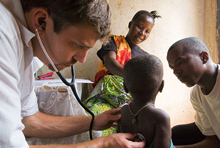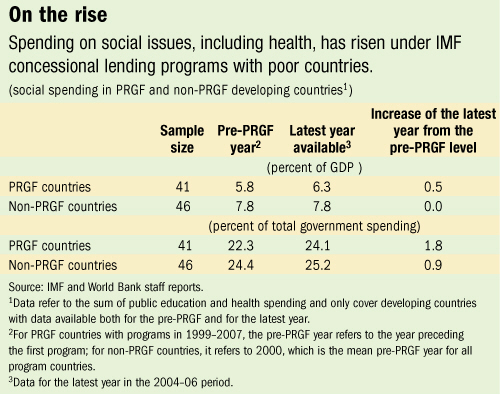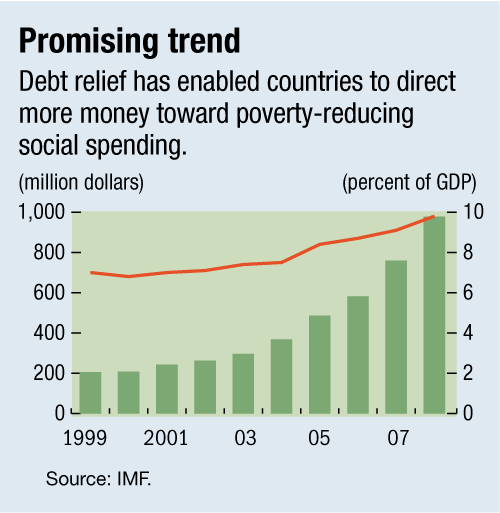
Typical street scene in Santa Ana, El Salvador. (Photo: iStock)
IMF Survey: IMF Helping Countries on Health, Social Spending Policies
July 25, 2008
- IMF working with countries to improve spending on health, education
- IMF cooperates with World Bank, UN in fight against HIV/AIDS, other diseases
- Technical assistance from IMF helps boost efficiency of health spending
As nations around the world grapple with the impact of high food and energy prices, the IMF is working with low-income countries to protect spending on health, education, and other services while addressing the inflation and balance of payments repercussions.

Clinic in Kono, Sierra Leone: IMF is part of global drive to raise health, living standards (photo: Sarah Bones/Global Action Foundation/ Philadelphia Inquirer/MCT)
HEALTH AND LIVING STANDARDS
"It's a bit of a balancing act," says Adrienne Cheasty of the IMF's Fiscal Affairs Department. "The IMF is keen for countries to maintain and even increase spending on health and education. But they are under growing pressure because of the rise in commodity prices."
In general, spending on health and other social programs has risen in low-income countries that borrow from the IMF under its Poverty Reduction and Growth Facility (PRGF) (see table below).
These low-income countries also have benefited from unprecedented global growth over the past few years, and in many cases from debt relief provided by the IMF and others (see chart). But now that countries are facing a slowing world economy and rising inflation, the IMF is working to help them preserve the gains they have made, through additional lending and policy advice.
The IMF recently published a paper outlining the scale of the shock to low-income countries from the food and oil price hikes and suggesting policy adjustments to cope with the increases. IMF advice includes targeted transfer programs to help the poor.
As countries struggle to meet the Millennium Development Goals (MDGs), the IMF is also working with governments to improve both the use of aid money and the ability of governments to cope with increased levels of aid targeted at social sectors, such as health and education.
The IMF's support for health
The IMF is part of a broad international effort to improve health and living standards, particularly in the world's poorest countries. This broad approach involves, first and foremost, country governments and citizens, but also international organizations, nongovernmental organizations, and the private sector.
Through its policy advice and technical assistance, the IMF aims to make a contribution to strengthening health services—an essential step in raising income and standards of living. The IMF does not get involved in specifics of health spending and priorities, but actively supports achievement of the MDGs—three of which relate to health.

The IMF helps countries mobilize resources and create room in national budgets for higher social spending. In addition, PRGF-supported programs typically seek to protect priority sectors, which include spending on primary education and basic health care, from possible spending cuts. Indeed, in some cases these programs include specific floors on poverty-reducing spending. Moreover, IMF-supported programs and policy advice back the full use of all available aid.

Poverty reduction
The IMF also focuses on the ways that low-income countries can achieve the high levels of growth that can foster poverty reduction—mainly by providing policy advice, technical assistance, financial support, and debt relief.
In addition, the IMF tries to ensure that developed countries' policies are supportive of low-income countries' development efforts by backing the scaling up of aid, the opening of markets to developing countries' exports, and the maintenance of a stable international economic climate that can help developing countries grow.
Further, the IMF is a vocal advocate for expanding official development assistance from the industrial countries, including through new and increased contributions to the Global Fund to fight AIDS, tuberculosis, and malaria. Efforts to attack these diseases are fully supported by the IMF.
Campaign against AIDS
Alongside the World Bank and United Nations agencies, the IMF is working in the campaigns against HIV/AIDS and other diseases, such as malaria and tuberculosis.
The IMF is also collaborating to expand country-level HIV prevention and treatment programs. Such programs are important components of many Poverty Reduction Strategy Papers (PRSPs), which are prepared by government agencies in collaboration with civil society and development partners. PRSPs provide the operational basis for concessional lending by the IMF and the World Bank and for debt relief under the Heavily Indebted Poor Countries (HIPC) Initiative.
Better budget management
A central principle of the IMF's economic policy advice is that public spending on critical social needs—healthcare and education—is among the most productive and responsible expenditures by a country.
The IMF, in cooperation with the World Bank and other development partners, is helping member countries improve their public financial management systems and ensure that funds, including those for health programs, are used efficiently and transparently. The IMF provides substantial technical assistance to help strengthen public financial management systems.
In addition, the IMF staff conduct extensive analytical and research work that informs policy advice to member countries, including on the macroeconomic and fiscal consequences of HIV/AIDS, and on other health issues.
The IMF has also provided technical assistance to member countries for improving the efficiency and effectiveness of health spending, particularly in transition economies. Indeed, this was an important part of the IMF's work, going back to the transition of eastern European countries from communism to market economies during the 1990s.
The IMF has poured cold water on a Cambridge University study linking IMF programs to an increase in tuberculosis in eastern Europe during this transition period [see "IMF Casts Doubts on TB Study."]
Comments on this article should be sent to imfsurvey@imf.org


